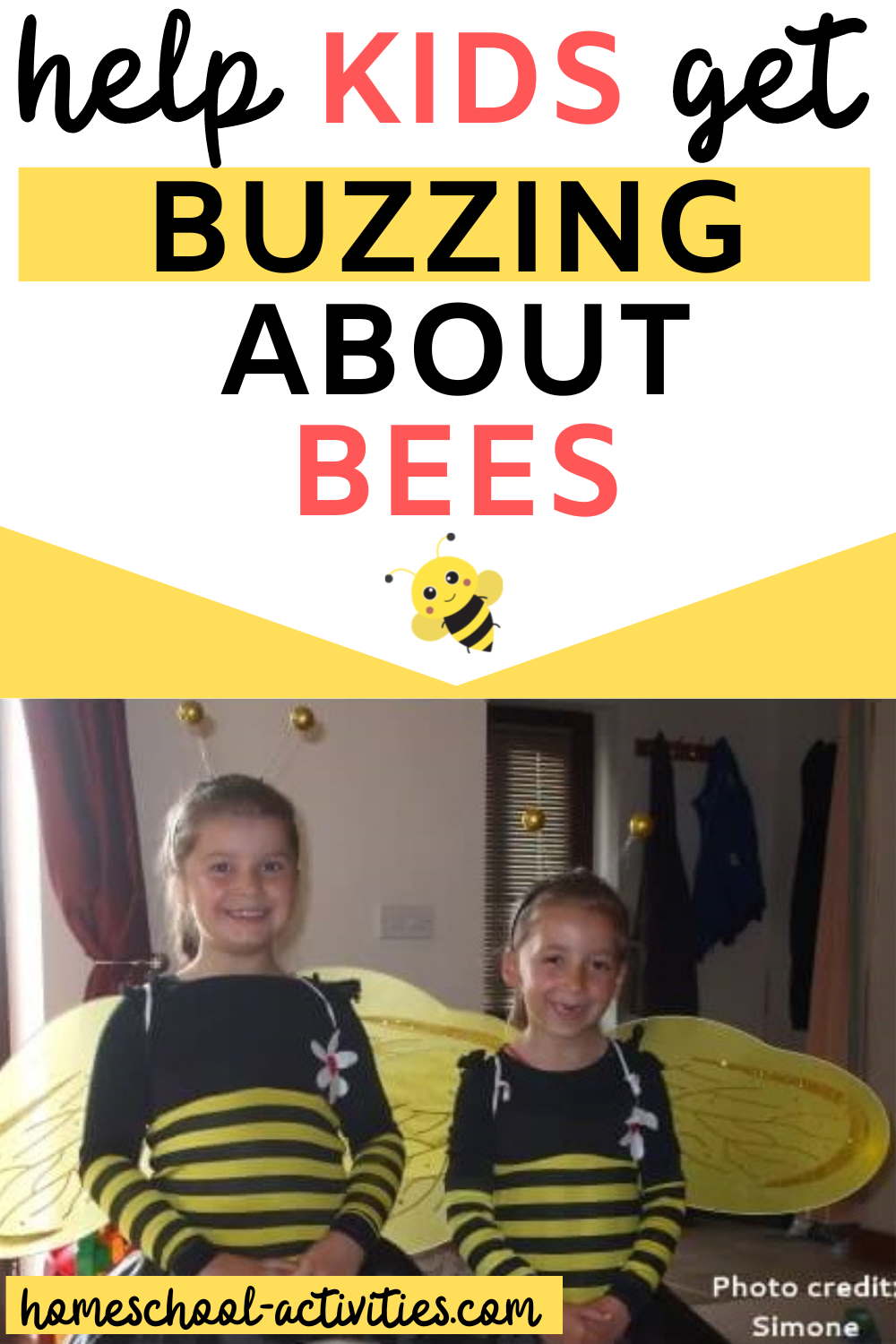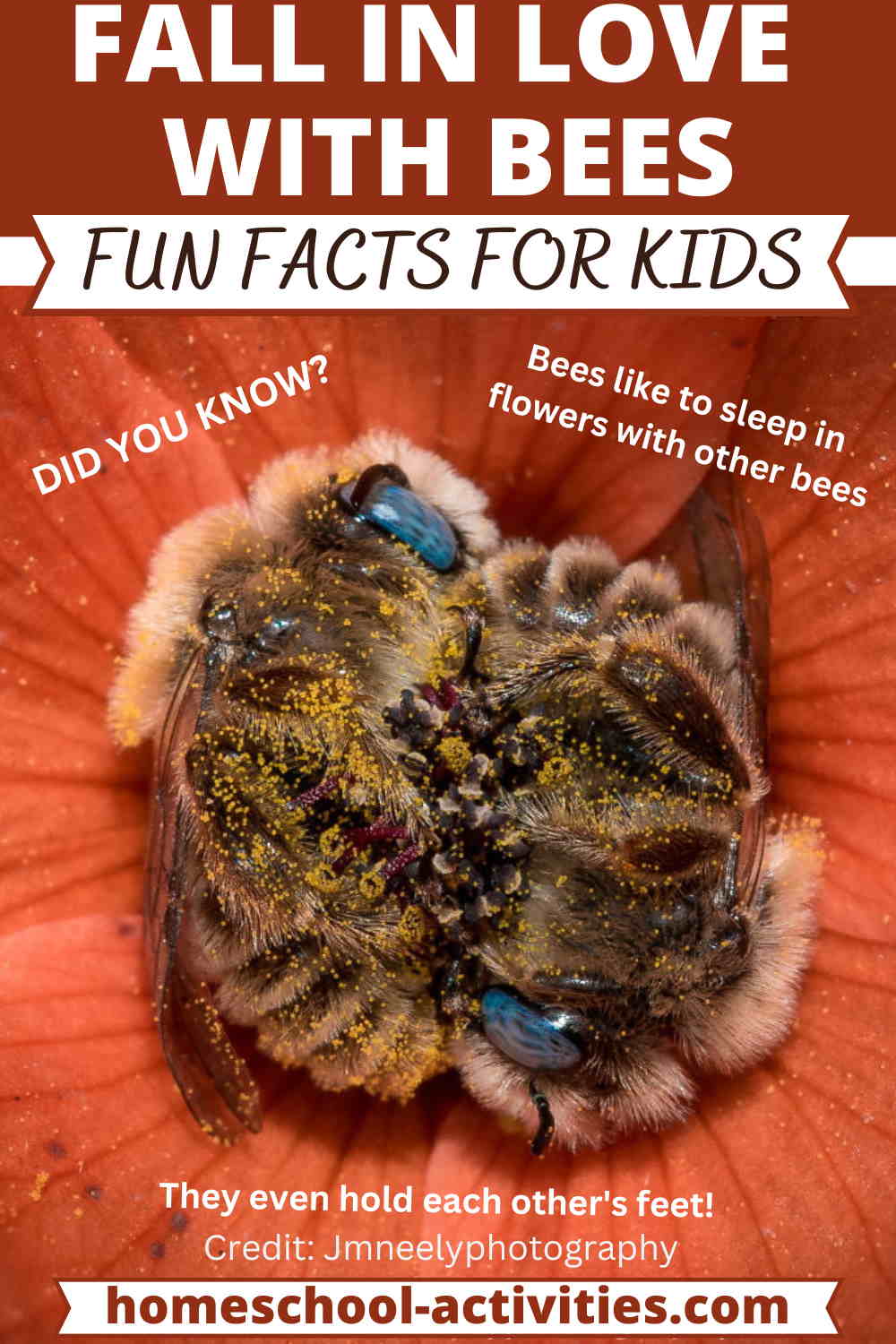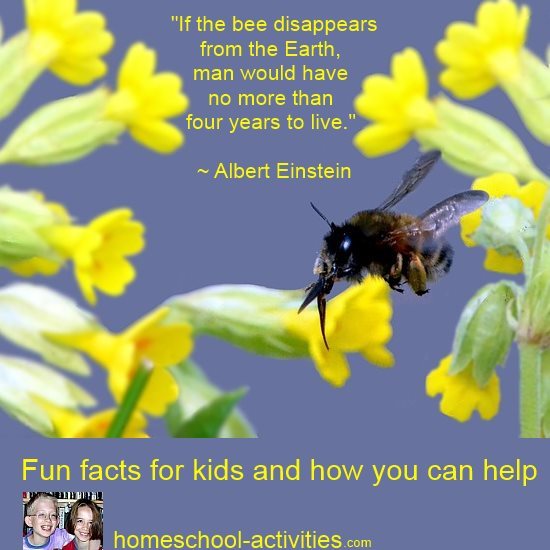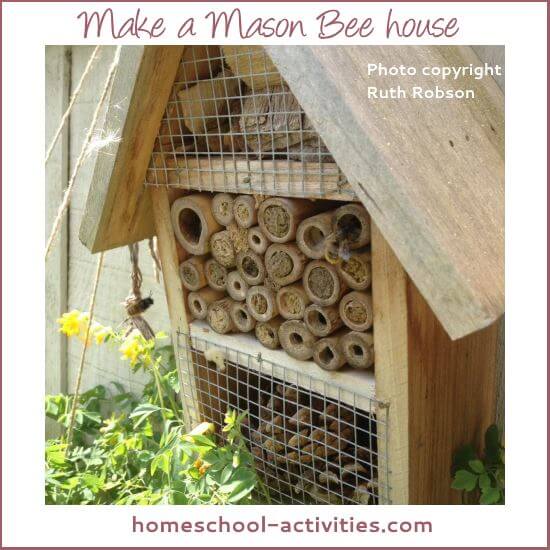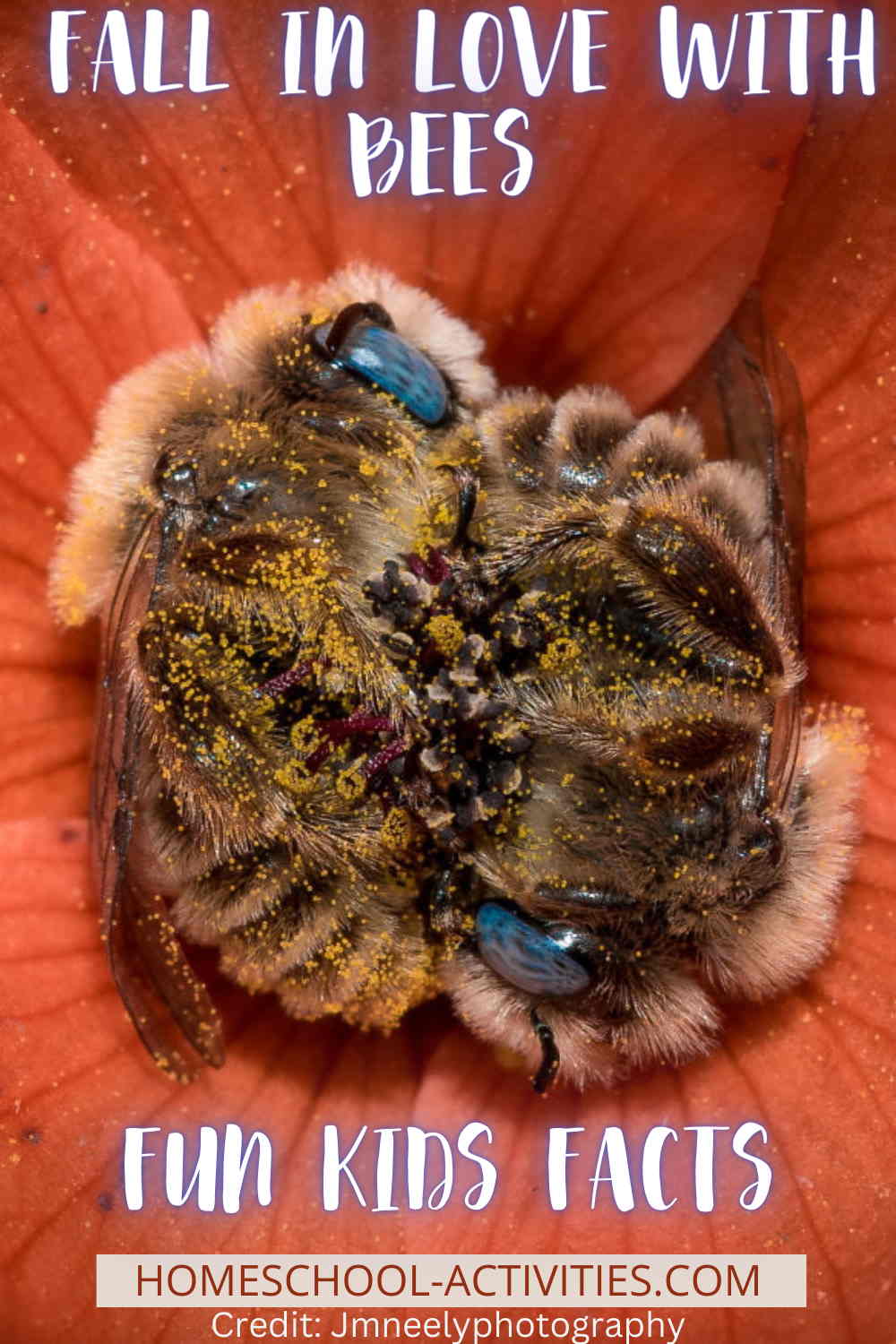Fun Bee Facts: How Kids Can Help
Teaching your kids fun bee facts is even better when you've got an expert beekeeper to help you discover their most fascinating secrets!
Thanks to Simone for this lovely photo of her daughters to prove that there are all sorts of fun bee activities you can do, including dressing-up!
You'll find out:
- We have bees to thank for being able to harvest everything from grapefruits to pumpkins.
- There are lots of easy ways for your kids to help this wonderful insect.
My friend Jon Milgate is a professional beekeeper.
He has written you this guest article and also teaches his kids at home. A perfect example of how you can combine teaching bee facts with homeschooling!
Did you know?
One of every three bites of food eaten worldwide depends on pollinators, especially bees, for a successful harvest.
You could use fun facts like these to make a kids lapbook on bees. If you're wondering what a lapbook is, you'll see when you look at the page!
Fun Bee Facts
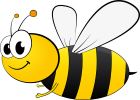
Each colony consists of one Queen, tens of thousands of Workers (female), and a few hundred Drones (male). All are dependent on each other.
The Queen is Mom to everyone in the hive & can live for up to 5 years.
She lays all the eggs (up to 2000 a day). But she cannot feed herself. She relies on the workers to feed her & groom her.

The Queen is long and slender, larger than the workers. She will not sting, unless threatened by a rival Queen, and she will only fly twice in her life: once to mate & then again when she may lead half the bees away in a swarm.
Fun Bee Facts:
A single bee can collect enough nectar to make 1/12 of a teaspoon of honey.
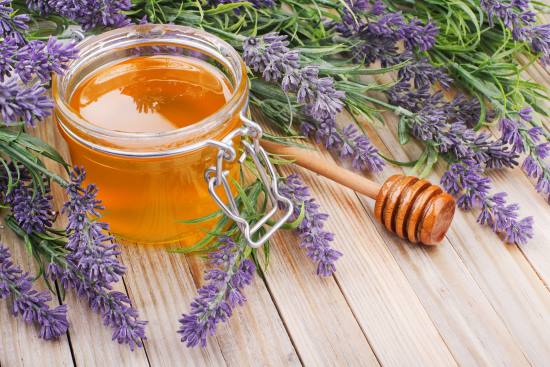

Sadly, the workers will only live for about 6 weeks.
There can be about 50,000 workers in the hive at the height of summer, going down to about 10,000 in winter.
They have lots of jobs, all of which depend on their age. For the first 3 weeks of their life they live in the hive. These ‘house’ bees keep the hive clean & hygienic, are nurse bees to the brood, feed the Queen and also guard the hive.
Have a look inside a bee hive here:
Fun Bee Facts:
During their short lifetime, worker bees fly the equivalent of 1 and a half times the circumference of the Earth!

Should there be a swarm the workers will make a new Queen from an egg by feeding it Royal Jelly. From 3 weeks old these bees become the ‘foragers’, flying up to two miles to collect pollen, nectar, water & propolis. They process the nectar, pollen & water to make honey, capping it with a lovely white wax when it’s ready.
This work in the summer is exhausting, hence their short lifespan (about 6 weeks). The workers that overwinter can live for up to 6 months.
Fun Bee Facts:
Bees see all colors except the color red.
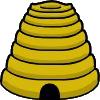
The Drones are the male bees. There are a few hundred in a hive & they do very little in the hive to help out.
Their purpose is to mate with a Queen. Drones congregate in large numbers in ‘Drone Runs’ awaiting Queens to mate with. We’re unlikely to see this as it happens 20-30 feet up in the air.
A Queen will mate with up to 20 Drones. Sadly, the act of mating kills the Drone. Those that are left in the hive at the end of the summer are forcibly ejected by the workers. They don’t need lazy men in the hive over winter doing nothing to help & eating all the food!
Fun Bee Facts
Bees flap their wings flap 11,000 times per minute, which is why it sounds like they are "buzzing".
Bee Crafts
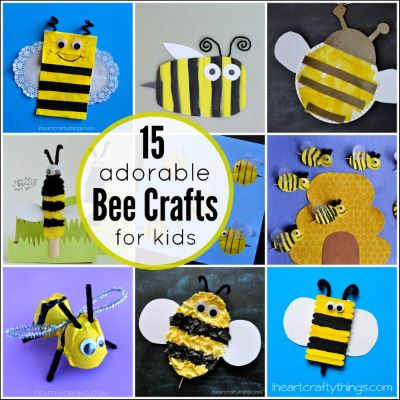
Rachel has some lovely bee crafts on her site, iheartcraftythings.com. Try making:
- Clothespeg and pipe cleaner bees
- A paper bag bee puppet
- Bees using popsicles and egg cartons
Click here to see them.
How Do Bees Make Honey?
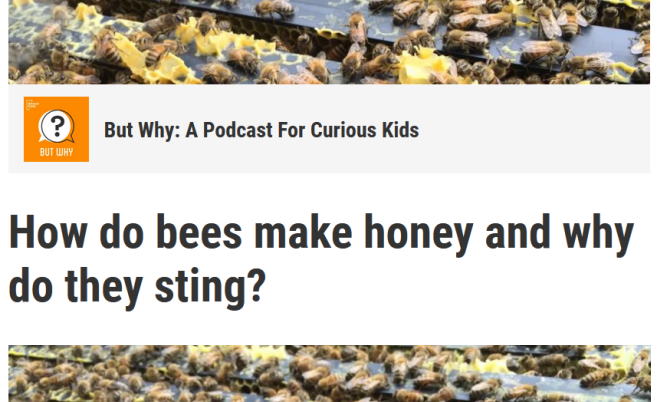
There's a fun podcast from a Beekeeper in Vermont. He keeps 450,000 bees and you can listen as he answers children's questions.
You'll also find a free bee coloring page to download.
Thanks to Tondie for spotting this.
Bees Need Your Help
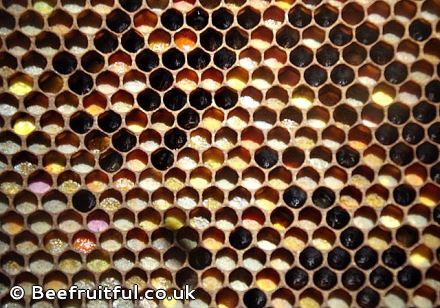
Bees are having a hard time & their numbers are declining.
Did you know?
For the last 10 years, beekeepers, particularly in the United States and Europe, have been seeing hive losses of at least 30 percent or higher.
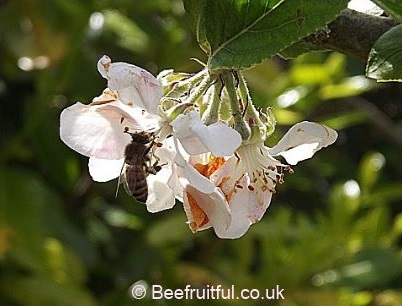
Here are some of the reasons:
- Farmers growing the same crop year after year
- Disease
- Parasites
- Pesticides
- Even beekeepers themselves must take some of the blame!

For example, every March, beekeepers from all over the US transport thousands of colonies of bees to California to pollinate the Almond trees, which are dependent on insect pollination to fruit.
This mass migration can stress the bees, leaving them weak & prone to infection.
They are then mixing with other bees from other areas and so increasing the chances of spreading disease.
The Almond is grown as a monocrop, meaning the bees have nothing else to forage on for a few weeks (imagine eating nothing but potatoes for a month!).
The Almond trees are sprayed against ‘pests’ also, potentially poisoning the bees. The flowers fade, the bees are transported back home.
During March, more than 50% of ALL the beehives in the US are in California to pollinate the Almonds.
80% of the worlds Almonds are grown in California.
It’s big business.
The UK is a much smaller country, but bee migration takes place here, too, especially for fruit blossom, such as apples and cherries.
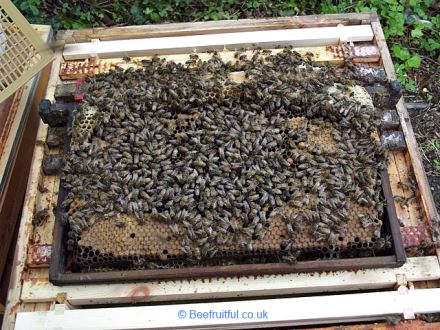
What You Can Do:

The easiest thing is to plant some flowers. Different types of bee like different flowers. Why not let a small patch of garden grow wild to see what flowers & what visits them?
Honeybees love Asters, Clovers, Borage, Thyme & Lavender amongst many others. Specific mixes are available to attract bees and/or butterflies.
Make A Mason Bee House
This wonderful Mason Bee hotel is made by my friend Ruth. As you can see, it works!
Keeping native non-stinging mason bees — even in urban spaces — is surprisingly easy, and it’s also an inexpensive and fun project for kids.
Here are some Mason bee facts to tempt you to have a go:
- There are about 200 species of mason bee worldwide with 140 in North America.
- They don't have stingers and they aren't aggressive, so you don't need to worry about getting stung.
- Unlike honey bees, mason bees are non-social creatures that nest in holes rather than in a hive with a queen.
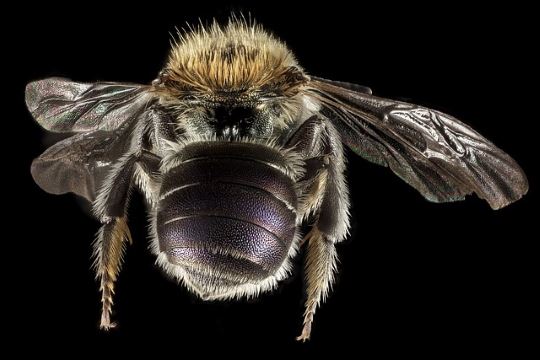
I have found some brilliant instructions from Marc Carlton from www.foxleas.com on how to make a mason bee hotel.


You can download his free instruction sheet here.
The instructions are for the UK but they will be useful wherever you are so long as you remember different species of mason bee need different diameters of tunnels.
Your hole diameters will be between 2mm and 10mm, but make sure you include plenty of holes of smaller diameters (down to 2mm).
Three mason bee facts to remember:
- When you build your mason bee condo, mud is a must.
- Site your hotel in full sun as mason bees are cold blooded and rely on the sun's warmth to get going in the morning.
- According to Marc, much better to make your own than try to buy one - a lot of the commercial ones are no good.
Befriend a Beekeeper
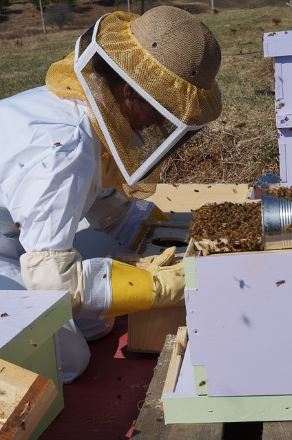
Another way to help the bees is to seek out and befriend a local beekeeper.
Most of us love an opportunity to talk about bees!
Supporting the beekeeper will help to sustain the bee population in your area. Local honey has great health giving properties and will help protect you from hay fever as you’ll be ingesting pollens from your area. Ask what you can do to help. If you're lucky, you may even be invited for a look at the bees.
- The American Beekeeping Federation can help with putting you in touch with a local beekeeper, as can the British Beekeeping Association.
Becoming A Beekeeper
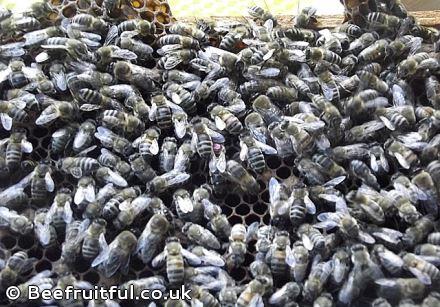
Finally, if you really want to go for it, become a beekeeper yourself! Join a local Federation or the Young Beekeeper's Program and attend a beginners’ course. Then you’ll be able to decide if it’s for you. They will offer a lot of advice and support.
Bees can easily be kept in a back garden, or on an allotment. Equally, most farmers will be quite happy for a hive to be placed in a corner of one of their fields, especially if you pay rent in honey!
It’s not a cheap hobby to start, but it is possible to more than make that money back in the first year by selling your honey and wax.

Bees are just one of the many nature activities you can enjoy. Get a free butterfly printable life cycle sheet and share the delight of raising butterflies in your home!
And if you'd like some tips for kids on nature photography, check out these tips from my homeschool daughter, who won the NG Kids magazine animal photo competition.
I think Jon has done a fantastic job in sharing amazing bee facts and encouraging your kids to help this wonderful insect.
Want To Remember This? Pin This Page To Your Favorite Board
"Just had a look through your monthly
newsletter focusing on math. Thanks so much for all the links and
ideas. It's brilliant!" ~ Diana
"Hi....I totally love all your posts and enjoy reading them....the kids love the activities and enjoy them through and through." ~ Bianka

Free Newsletter

Must-have Handbook
4 books in one: Bargain discount deal!
"With the education system failing so many brilliant
children it's great to be able to have resources like your website for
inspiration, ideas and just a sense of belonging. What you are doing for
your children is priceless." ~ Natalija
"I really appreciate your time and effort that goes into your posts... It's nice to see that you are a 2nd generation homeschooler." ~ Teresa
"Your newsletters & book have helped us through our journey. For that I can only thank you.
Please, please, please keep it up, people like you make our home school life so much easier." ~ Kelly
"I have joined paid sites that were not even one percent as great as
this site. Really amazing what you are doing and so so helpful thanks so much!" ~ Eli
